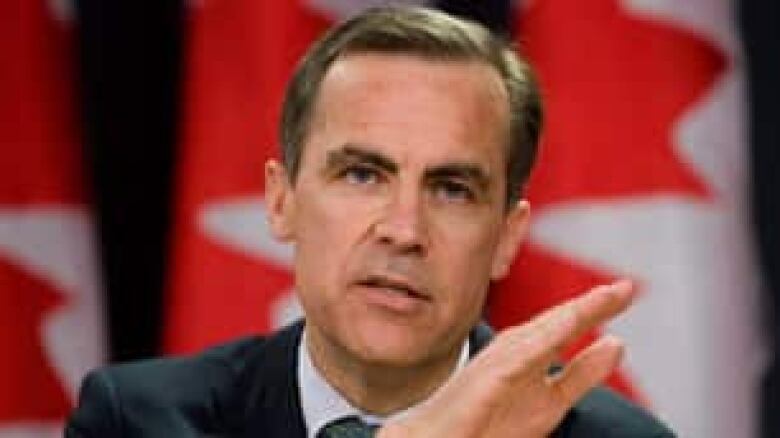Inflation higher than expected: Carney
Bank of Canada boss calls country's productivity record 'abysmal'
Bank of Canada governor Mark Carneyappeared to sendsignals Wednesday intended to prepare Canadians for an increase in interest rates, spurred by concerns about inflation.
But there was nothing that suggested the bank will move earlier than the widely expected date of midsummer.

Inflation has been rising more than the bank expected, Carney acknowledged in a speech toa conference in Ottawa put on by the Canadian Association for Business Economics.
"Core inflation has been slightly firmer than projected," he said.
The core inflation rate excludes more volatile prices for food and energy and is closely watched by the Bank of Canada in making decisions about whether to increase rates.
The bank lowered its overnight target interest rate last April to a record low 0.25 per cent and said it would more than likely keep it there until July of this year.
At the same time, it predicted the core rate would fall short of its target annual rate of two per cent until the second half of next year.
Core-rateincrease higher than predicted
But Statistics Canada reported on Friday that the annualized core rate in February was 2.1 per cent, up from two per cent in January, and ahead of most economists' predictions of 1.7 per cent.
On March 2, the bank reconfirmed its plans to hold off on any rate increase until the summer, but on Wednesday Carney warned that this is "expressly conditional" on the outlook for inflation. The bank will update that outlook in its next monetary policy report, to be released April 22.
In an exclusive interview on the CBC's Power & Politics with Evan Solomon, Carney said "expressly" should not be taken as a signal that the bank is about tochange its stance adopted last April.
"That's held since then. It holds today," Carney told Solomon."We'll update our views in April and we'll let Canadians know at that point."
Noting that increased hotel rates during the Vancouver Olympics counted for more than half of that bump up in prices in February, Carney said the bank would continue to watch for signs ofwhetheranything has changed in the momentum of inflation.
Sal Guatieri, senior economist with BMO Capital Markets, told CBC News there's nothing in Carney's speech that suggests the bank is "itching" to raise interest rates.
"We think the bank is still committed to keeping interest rates on hold at least until the middle of this year but then will begin to gradually raise interest rates starting in July," Guatieri said.
June increase can't be ruled out
But Eric Lascelles, a strategist with TD Securities, said Carney's use of thewords "expressly conditional" will encourage speculation that rates could rise in June, "especially given that the inflation projection can reasonably be expected to rise."
In a commentary, Lascelles said a June 1 rate hike "can no longer be ruled out, and may even enjoy a probability of 50 per cent (or possibly more)."
Carney also took aim at Canadian businesses for failing to invest enough in productivity growth, the measure of the increase in value of goods and services produced by each working Canadian.
DescribingCanada's recordas "abysmal," he predicted that if the trend isn't reversed, falling productivity could cost every Canadian $30,000 in income over the next decade.
He criticized business for not investing more in new technology and training,andthe country for notputting more into training workers to improve their skillswith computers andcommunications technology.
Carney told Solomon that Ottawa and the provinces have made "tough choices" to cut taxes, reduce regulation, build infrastructure andlower tariffs, and now it's time for business to react by increasing investment.
"We need that investment response," he said. "We need that productivity growth to operate in what's going to be a much more difficult global environment."
Carney said Canadians are well-educated but not in the areas where they could be most competitive internationally. He also called for the country tofostermore competition in thetelecommunications, electricity and retail industries.












_(720p).jpg)


 OFFICIAL HD MUSIC VIDEO.jpg)
.jpg)



























































































